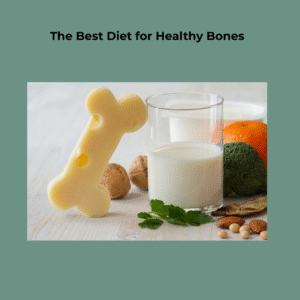Eat This, Not That: The Best Diet for Bone Health
Eat This, Not That: The Best Diet for Bone Health
It’s easy to think of bones as hard and lifeless, but in reality, your skeleton is alive—constantly rebuilding, repairing, and renewing as it responds to the demands you make of it.
And just like your muscles, bones need the right fuel to stay strong.
The truth is, nutrition is one of the most powerful tools you have to protect your bones. Whether you’re 25 or 75, what you eat can help strengthen your skeleton, support posture, and reduce the risk of fractures later in life.
Let’s break down the best (and worst) foods for bone health—so you can make better choices at every meal and get the best diet for bone health.
🍽️ The Best Diet for Bone Health
If you want a strong skeleton, build every meal around these bone-building nutrients:
1. Calcium – The Cornerstone of Bone
Your bones are your calcium bank account—about 99% of your body's calcium is stored there.
💪 You need around 1,000 mg/day (or 1,300 mg/day for postmenopausal women and older adults).
Best sources:
- Dairy: milk, yoghurt, cheese
- Leafy greens: kale, bok choy, spinach
- Tinned fish with bones: sardines, salmon
- Fortified products: almond/soy milk, breakfast cereals
Pro tip: Don’t try to get it all in one meal. Spread calcium intake throughout the day for best absorption.
2. Vitamin D – The Calcium Gatekeeper
Without vitamin D, your body can’t absorb calcium effectively.
Best sources:
- Sunlight (10–20 mins on skin, depending on skin tone and time of year)
- Fatty fish: salmon, mackerel, tuna
- Eggs
- Fortified foods or supplements
Low in vitamin D? You’re not alone—many Australians are. Consider a supplement, especially during winter or if you spend little time outdoors.
3. Magnesium, Vitamin K2, and Protein – The Supporting Cast
Bones aren’t just calcium! These nutrients help structure and metabolism:
- Magnesium: nuts, seeds, avocado, whole grains
- Vitamin K2: fermented foods like natto, cheese
- Protein: meat, legumes, dairy, tofu
Aim for 20–30 grams of protein per meal to support the collagen matrix of your bones.
🚫 What to Limit (or Avoid) for Bone Health
Not all foods are friendly to your bones. Some actually deplete minerals or interfere with absorption.
1. Excess Salt
High salt intake leads to calcium being excreted in urine though the effect is small
🧂 Avoid processed foods, chips, canned soups, and sauces. Read labels and aim for less than 2,300 mg sodium/day.
2. Soft Drinks (Especially Cola)
These contain phosphoric acid, which may lead to bone mineral loss when consumed in excess—especially if they’re replacing calcium-rich beverages like milk.
🥤 Try sparkling water with lemon or kombucha as healthier alternatives.
3. Too Much Caffeine
Coffee lovers, don’t panic! But high levels of caffeine (more than 3 cups/day) can reduce calcium absorption.
☕ Pair coffee with a calcium-rich snack—or limit intake if bone density is a concern.
4. Alcohol
Heavy drinking interferes with bone-building cells and calcium balance. If you drink, do so in moderation—1–2 standard drinks per day, with alcohol-free days each week.
🧠 Practical Meal Tips for Bone Strength
- Start your day with Greek yoghurt + berries + chia seeds
- Snack on almonds and dried figs
- Make lunch a salmon salad with leafy greens
- Dinner? Stir-fry with tofu, broccoli, and brown rice
And if you’re in a rush, a calcium- and protein-rich smoothie is a great on-the-go option.
✅ What You Can Do Today to get the Best Diet for Bone Health
- Audit your pantry – Look for calcium-rich and magnesium-rich foods
- Check your vitamin D levels – especially in winter
- Book a spine and posture check – nutrition is key, but alignment and loading matter too
Wondering if your lifestyle is supporting your bones? Let’s talk. Book a spinal health check today and get personalised strategies to protect your strength, posture, and confidence for years to come.
